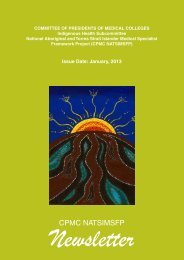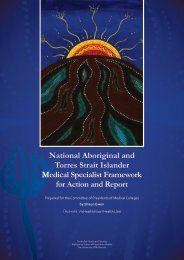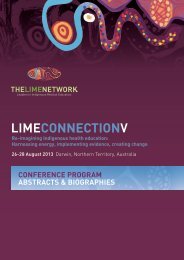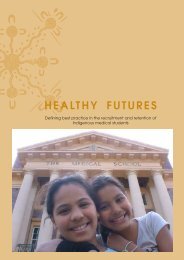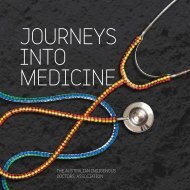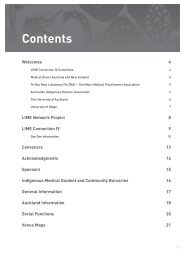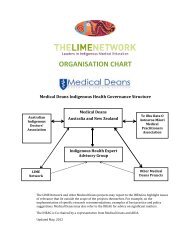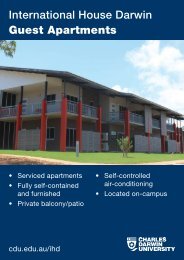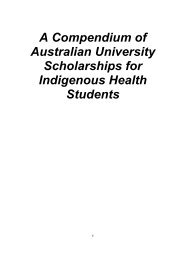abstracts and bios cover_final.indd - LIME Network
abstracts and bios cover_final.indd - LIME Network
abstracts and bios cover_final.indd - LIME Network
You also want an ePaper? Increase the reach of your titles
YUMPU automatically turns print PDFs into web optimized ePapers that Google loves.
Overview of admission methods for medicine <strong>and</strong> early experience with recruitment<strong>and</strong> retention in a new schoolProfessor Neville Yeomans 1 , Ms Cris Carriage 21. Former Dean, School of Medicine, University of Western Sydney2. Indigenous Program Officer, School of Medicine, University of Western SydneyAbstractA range of methods for determining offers to medical places is used around Australia. All use school orundergraduate academic results as a key component of their admissions formulae, although many now usethis just as an initial threshold to be reached before other methods are applied. Those other tools may includeaptitude tests, interviews of two main types, <strong>and</strong> portfolios provided by applicants. All Australian schoolsmake adjustments to their processes to offer places to students of Indigenous <strong>and</strong>/or rural background. Thepresentation will discuss these various approaches.About ten applications have been received each year, processed case-by-case, using academic record,Undergraduate Medicine <strong>and</strong> Health Sciences Admissions Test (UMAT) results when available, <strong>and</strong> a Multi-Mini-Interview. Indigenous applicants also have a personal interview with a panel including two Indigenousinterviewers.The prior academic records of most of the 14 applicants enrolled thus far have generally been weaker,sometimes markedly, than for the other ~285 students (from ~7500 applicants) admitted to Commonwealthsupportedplaces. The panel tries to allow for disadvantaged opportunity when judging likelihood to succeed,but this is an inexact science. In the 2007 cohort, 2 of 5 failed Year 1 <strong>and</strong> one withdrew, but all successfullyrepeated the year. Another passed but deferred <strong>and</strong> is also in Year 2. In the 2008 cohort, 3 of 4 passed (2 verywell) <strong>and</strong> 1 is repeating Year 1. From the 2009 cohort, one deferred after several weeks to solve a major familyproblem. Factors predicting difficulties or success will be discussed.Presenter: Professor Neville YeomansNeville is Foundation Dean (until October 2009) of the University of Western SydneyMedical School, <strong>and</strong> previously Foundation Professor of Medicine at Western Hospital,Melbourne <strong>and</strong> Associate Dean (Academic Programs), at The University of Melbourne.He is a gastroenterologist with research interests in the basic <strong>and</strong> clinical science ofgastric mucosal defence <strong>and</strong> peptic ulcer, <strong>and</strong> more recently medical education.30



